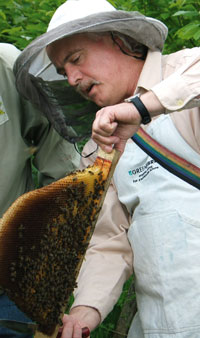Source: New Internationalist
For the past two centuries years we’ve been trying to dominate and control the natural world. Beekeeper Philip Chandler argues that it’s time to learn from our mistakes, while we still have time.
 |
|
Destruction in the name of progress: hardwood rainforest logs being stacked for export near Abidjan, Ivory Coast. Photo by Ron Giling / Still Pictures. |
Beekeeping in Europe and North America is no longer sustainable in its present form. We need to re-think our management methods from top to bottom – or face an unprecedented decline in the health and strength of the bee population and the end of honey as a pure, healthy food.
Intensive beekeeping – especially on a commercial scale – generates massive amounts of energy-consuming work in return for an unpredictable honey crop. Copious quantities of energy and water are consumed in manufacturing, cleaning and sterilizing equipment, rendering wax and cleaning up the inevitable, intractable, sticky mess. Transporting our kit around the countryside also burns carbon fuels by the tankful.
Meanwhile, ‘scientific’ chemical treatments have resulted in fitter parasites and tougher bacteria. We artificially maintain bees that are ill equipped to deal with infections or infestations, despite their ancestors having done so, unaided, for at least 100 million years. Some beekeepers routinely use potentially dangerous and illegal chemicals – including antibiotics and organophosphates – risking prosecution as well as their health and their customers’ health, while having little or no long-term impact on the bees’ problems. Many of these chemicals persist in beeswax, which is recycled into new comb by the worker bees. A low-dose cocktail of who-knows-what is then passed to the next generation.
All this might be understandable if the results were bumper crops of honey and happy, healthy bees. However, honey crops will forever depend on the weather more than any other single factor. As I write, our bees are suffering from unprecedented levels of infestation by the varroa mite and endemic infection by mite-borne viruses. Thanks to those who persist in shipping bees around the world, instead of breeding from local stocks, the small hive beetle will most probably arrive in Britain soon. So-called Africanized bees may not be far behind.
In the modern, Western world, where relatively few people have a day-to-day, intimate relationship with nature, public appreciation and understanding of the pivotal importance of the honeybee in the greater scheme of things has been largely lost. Many people regard bees as pests rather than a vital, natural resource. A surprising number of people cannot tell a honeybee from a wasp. Our Government would rather cover the countryside with untested, genetically modified crops than invest in sustainable, organic farming or fund research into bee diseases. Even our British Bee Keepers Association takes money from agrochemical companies in return for their patronage of poisonous sprays and, it seems, their passive acceptance of genetically modified (GM) crops.
In practical terms, sustainability may mean accepting lower honey production in return for healthier bees. It may mean, at least in the short term, accepting heavier winter losses in return for improved vigour in surviving colonies. It almost certainly means increased vigilance in inspecting colonies and assessing desirable traits, which will mean that more beekeepers will need to educate themselves in bee husbandry and breeding.
 |
|
Philip Chandler: ‘We may have to re-think the unthinkable: that commercial beekeeping is inherently unsustainable.’ |
Natural lifecycle
The remedy, as well as the blame, for the current parlous state of beekeeping lies with beekeepers themselves: nobody else knows enough or cares enough to take the necessary action. We need to share more information with each other and make more effort to educate the public, especially the next generation.
We may need to re-think much of what we now take for granted, even if it means discarding protocols we have regarded as holy writ for the last 150 years. We may have to think the unthinkable: that commercial-scale beekeeping is inherently unsustainable. Keeping 100 or more beehives in an area that nature might furnish with only one or two colonies is very like cramming 10,000 chickens into a battery farm and has similar implications for aberrant behaviour and spread of diseases.
We must look closely at our complicity in the over-use of agricultural chemicals and find ways to achieve a good honey crop that don’t rely on pumping poisons into the environment. We must accept that chemical treatments for mites and brood diseases are ultimately doomed to failure, as they inevitably create dependency. The long-term answer lies with the bees themselves. Our job is to provide them with the best possible conditions in which they can solve their own problems, as they have always done.
Looking back over last 150 years we can see how commercial beekeeping developed from the Victorian desire to dominate the natural world and subjugate its inhabitants to human will. This was the dominant paradigm through the first two thirds of the twentieth century – until we began to wake up to what was happening to the planet as a result of our arrogant assumption that we could treat it as a bottomless waste pit. Some of us looked out at decimated forests, depleted soil and polluted water and realized that we had to change our ways.
The current rapid growth of the organic food movement indicates the beginnings of a shift in public perception. Meanwhile, the global dominance of a handful of agrochemical corporations, intent on covering the earth with genetically mutated organisms and chemical-dependent crops, represents the old order, stubbornly clinging to old ways.
The big lesson of the last century was that the way we treat the natural world has repercussions beyond the immediately obvious. Our destruction of rainforests and other wild areas in the name of ‘progress’ has led to a cascade of species loss, soil erosion and climate change that we are only beginning to understand and that will haunt us for generations.
So it is with the bees. For a century and a half we have assumed that we know better than they do what living conditions they require, what size cells they prefer, how many colonies can live in close proximity. We have sought to bring under our control every detail of their lives down to the mating of their queens. And now we are reaping the rewards of our arrogance: bees that are dependent for their survival on chemical inputs and human interventions.
Can this situation be reversed?
Nobody can say for sure. But those who are experimenting with sustainable beekeeping believe the answer lies in a low-tech approach that allows bees to build honeycomb according to their own design, eliminating the artificial constraints imposed on them by the use of frames and wax foundation. Foundation (artificial comb) was introduced as a way of ‘helping’ the bees – saving them work so they could do more work for us, i.e. make more honey.
Sharing information
But artificial comb – of whatever size – is part of the old control-freak, we-know-best paradigm that has caused the current problems. Having seen the beautifully formed, naturally constructed comb that bees build in ‘skeps’ (old-style conical hives built of straw) and in my top bar hives (simple, intermediate-technology hives with no frames or foundation), I would not go back to frames and foundation if they were giving them away.
Bees need to build comb. It is a part of their natural lifecycle and a part of their biochemical makeup to extrude wax and to work it. And they need the freedom to build it their way.
If that means they raise 15 per cent of their colony as drones (non-worker male bees) then so be it. That is what they need to do; we may never know the reason why, nor do we need to know. Our preoccupation with drone culling cannot but affect the quality of queens, as many of the most important traits are passed down the drone line. It would not surprise me if the many stories of poor quality queens I have heard and read about recently were caused by a local shortage of good drones.
I am now looking at beekeeping as more of a conservation and restoration project than a profitable hobby. Much as I love honey I am more interested in breeding bees that can look after themselves.
I don’t know to what extent I will succeed but I hope that others will take up the challenge and that, by sharing information, we can find a way to develop a balanced system of beekeeping that is genuinely sustainable. Then the bees will have a chance to re-establish feral colonies, which will form the all-important genetic pool for future generations.
I have been keeping bees in natural-comb top bar hives for eight years now, and having seen the enthusiasm with which a swarm set about constructing its home from scratch and experienced the simplicity of this low-tech style of hive, I would like to invite all beekeepers to build and try one next season alongside their normal boxes.
I guarantee it will enrich your beekeeping experience.
***
